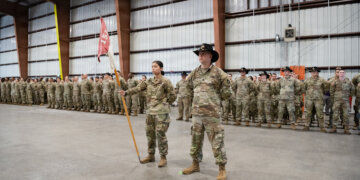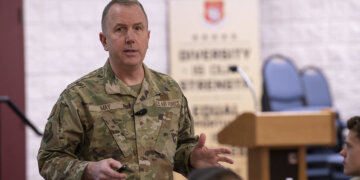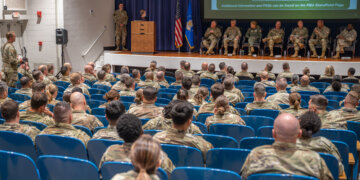Nine cyber warfare soldiers from Maine will spend one year on a stateside mission, following their work assisting a partner nation with its own cyber attack.
1st Lt. Nathaniel Allen, executive officer of the 146th Cyber Warfare Company — also an information security analyst for Camden National Bank in his civilian career — is among those mobilizing this month for the deployment to Fort Gordon, Georgia.
“Our unit was stood up in 2017 and within that the Maine Guard has been really pumping a lot of resources into not only defending itself but giving us the ability to support our partner nations,” he said during a press call held by the Maine National Guard public affairs office.
Col. Michael Steinbuchel, deputy chief of staff for information management, said in a news release announcing the deployment that as the world rapidly changes, so does the battlefield.
“That means the total Army – active and reserve components – is having to evolve to meet cyber threats to our national security head on,” Steinbuchel said.
Just last year, the unit assisted its partner nation Montenegro when it was hit with a cyber attack. The multi-day event – that Montenegro blamed on the Russian government – affected electricity, water systems and more, according to an August 2022 report from the Council on Foreign Relations.
RELATED: Cyber Joint Task Force agreement allows guardsmen to protect school networks
“That’s just one country in the world, but we get cyber attacked every day across the whole nation, and we’re so relying on this technology, it’s important we have warriors that can do the offensive and defensive side,” Allen said.
Being activated for the Montenegro attack gave the unit the opportunity to test its abilities and skillsets in a real-world scenario, Allen said.
“It’s one thing to plan,” Allen said. “And as a leader in an organization, every plan is great and then you give it to your soldiers, and they execute, but as soon as first contact happens, everything goes out the door, right? And so for us, it was being able to adapt to situations. Because just like in combat, situations can change in moment and within cyber things can change very quickly where if you make a wrong move, you can further this compromise.”
The added pressure gave Allen a glimpse of what his soldiers are capable of, along with their strengths and weaknesses, that he can now build upon for the upcoming mobilization.
Allen said his soldiers train year-round on defender and attacker scenarios, along with keeping their IT skills fresh and being given certification opportunities.
Soldiers train to address compromised accounts, signs of Distributed Denial of Service (DDoS) attacks – when an attacker tries to deny a user from entering a network or computer system because it’s being flooded with an attack – and brute forcing, in which a program is constantly attacking passwords and using different algorithms to try and access accounts and systems.
Allen said cyber units like his look for individuals with the “want” to learn more and who have the drive to understand computer networks and how to protect them.
“You don’t have to come in with all these certifications and experience,” Allen said. “When I first joined the unit, I was a political science major in college. I had no thought about being in a cyber company, let alone a signal officer. And they gave me the skillsets, but I just had the want to learn and maybe a little bit of the aptitude of wanting to learn more.”
When attending the University of Southern Maine, Allen enrolled in ROTC and was a political science major with a minor in German.
“I was going to be a diplomat,” Allen said. “Then I was slotted for active-duty military intelligence with a branch detail artillery and at the last second, I was like, ‘The guard is a great choice for me.’”
When he made the move to the Guard, he shadowed signal corps members prior to commissioning.
“I kind of fell in love with it. It was a very, very cool thing that the Army made me do that I was like, ‘I actually really like this,’” Allen said.
From there, the Army paid for his certifications, which gave him experience and allowed him to take those skills from the military to the cyber field at the bank.
ARCYBER’s mission involves integrating and conducting “cyberspace operation, electromagnetic warfare and information operations in order to ensure decision dominance and freedom of action for friendly forces in the cyber domain,” the release stated. It has locations at Fort Gordon, Georgia; Fort Huachuca, Arizona; plus five regional centers in Arizona, Hawaii, Germany, Korea and Kuwait.







































